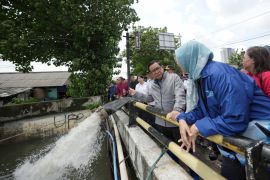"The giant sea wall is planned on necessity not on some sort of image projection. Therefore no one should make a controversy of it," Bambang, who is minister for national development planning, said in a year-end discussion here on Saturday.
The national Capital Integrated Coastal Development (NCICD) has been in the center of controversy following corruption case involving the city councilor and a developer.
Bambang said he has submitted to President Joko Widodo a report about calculation and comprehensive analysis of the project.
He said the project become urgent as the city is sinking faster than previously expected.
"We are confronted with a situation of the city sinking faster than originally estimated. Not only Jakarta but all coastal areas of Java tend to sink," he said.
Semarang of Central Java has even flooded with sea water, he added.
"Jakarta sinks much faster than previously estimated because of much use of ground water, therefore, we have to address this problem immediately," he said.
The capital city, one of the worlds most densely populated cities, sits on a swampy plain and is sinking at a faster rate than any other city in the world.
The first phase of building the giant sea wall that will cost around Rp10 trillion is to keep Jakarta from caving in until 2025, he said.
In addition the city administration has to control the use of ground water by improving the drinking water supply system, he said.
"For that purpose in the next phase we need to build sea wall not on-shore but off-shore that the cost would be much high at Rp70 trillion up to Rp80 trillion. That might save Jakarta until 2040 or longer," he said.
The plan, therefore, has to be carefully drawn and the technology is not easily available, he said.
He said the sea wall on shore has to be built soon in places where the ground sinks faster, adding by 2020 or 2021, the government has to start planning construction of the off shore wall.(*)
Editor: Heru Purwanto
Copyright © ANTARA 2017










